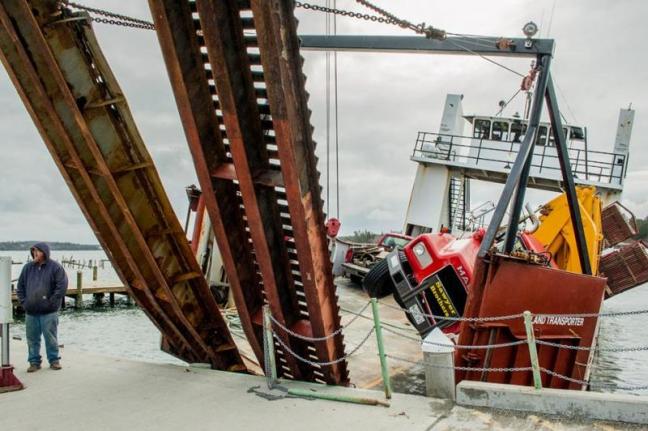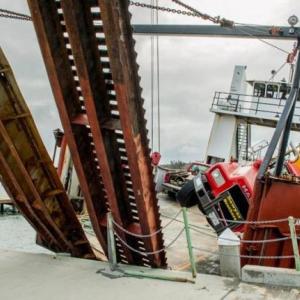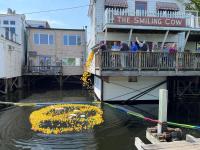Thomaston business awarded $257,154 following rough ferry crossing
PORTLAND — A U.S. Chief District judge, District Court of Maine, entered a judgment in a civil lawsuit filed by the owners of a Thomaston contracting business against a private Rockland ferry service, claiming negligence, causing them to fear for their lives and heavily damaging their equipment during a rough crossing in December 2014 to North Haven.
Ross Sawyer, of Warren, and Ryan Sawyer, of Thomaston, owners of Sawyer Brothers Inc., filed a lawsuit Aug. 20, 2015 in U.S. District Court in Portland against M/V Island Transporter and Island Transporter LLC., which owns and operates the 95-foot motorized ferry operating out of Rockland. Capt. David Whitney, of Island Transport LLC, was not named in the lawsuit.
U.S. Chief District judge Nancy Torresen entered a judgement Nov. 3 following a bench trial for a total amount of $257,154 in favor of the plaintiffs, Sawyer Brothers, Inc., against M/V Island Transporter, according to the court document.
The judgment award of $257,154.03 allocates $131,884.03 for lost property, $25,270 for lost profits and $50,000 for each plaintiff covering emotional distress. Also included in the award is prejudgment interest as permitted by law.
One of the two attorneys who represented the Sawyers, Twain Braden, of Portland, said Dec. 12, “we are pleased with the court’s favorable decision, but it is under appeal and it would therefore be inappropriate for me to comment at this time.”
According to the court documents, in early December 2014, Sawyer Brothers Inc., a Thomaston business that installs concrete forms at construction sites throughout Maine, contracted with a homeowner on the island of North Haven to install concrete forms on their property. They made arrangements with the ferry service to transport their equipment, consisting of a boom truck with a load of panels and hardware, a cement mixer and a pickup truck, from Rockland to North Haven on the deck of the M/V Island Transporter.
Ryan Sawyer said in the suit that he received a telephone message from Whitney referring to possible showers the day of their departure, but otherwise did not receive any information about the possibility of rough or adverse weather. On the same day that Ryan Sawyer confirmed the transportation, the National Weather Service issued a small craft advisory for the day of travel, with winds and gusts expected up to 30 knots on open water, according to court documents.
The suit further claimed that on the day of the crossing, the vessel’s crew positioned wheel chocks around the tires of the Sawyers’ three vehicles, but did not secure or lash any of the vehicles to the deck of the ferry with chains, straps or ratchets. The crew advised the Sawyers to remain inside the vehicles during the crossing but did not address any safety issues, including the location of lifejackets or other safety equipment.
Before the ferry left Rockland Harbor, it began pitching into the seas, experiencing an estimated 3-foot chop. Once the ferry departed and approached open seas, the waves reached a height of seven feet, according to the court document. The vessel began to roll “violently,” which caused the boom truck to slide sideways, across the deck of the vessel, and tip over on its side along with the pickup truck and cement mixer, situated on the stern of the vessel.
Both the boom truck and cement mixer ultimately came to rest on their left sides, and did not fall into the sea because of the steel bulwarks, but they alleged that specialized equipment fell off the truck and was lost in the ocean.
Ryan Sawyer had been seated in the cab of the boom truck when it tipped over at an angle, and was trapped inside the cab for several minutes as it pitched against the bulwarks and appeared to be about to roll into the sea. He was able to climb free by forcing open the passenger door, and leaped down from the cab onto the deck of the vessel.
He said he “feared for his life” and Ross Sawyer said he was “delirious with fright” after he saw the 54,000-pound boom truck slide across the deck.
The boom truck remained on its side for the duration of voyage, its steel rack, body, cab and related equipment pounding against the steel bulwarks of the vessel, damaging the boom truck and equipment beyond repair, according to the court document.
The suit claims that the ferry service failed to issue any warnings to the passengers regarding safety concerns, nor did the Captain attempt to return vessel to the harbor. Only after the trucks slid sideways and tipped on their sides did a crew member emerge from the enclosed cabin and issue life jackets to the passengers, according to the court document.
The voyage lasted approximately one and a half hours, and required the assistance of a U.S. Coast Guard vessel, which positioned itself to the windward of Island Transporter to protect the vessel from the worst of the waves. The vessel was further assisted by the North Haven ferry, which positioned herself to the leeward side, according to the court document.
The lawsuit was seeking no less than $50,000 in damages for negligence of the part of the defendants, emotional distress caused by the voyage, and compensation for the loss and damage to the Sawyers’ vehicles and loss of considerable profits.
The Sawyers were represented by attorneys Leonard W. Langer and Twain Braden of Thompson Bowie and Hatch LLC in Portland.
Related story:
• Big seas send cement truck on side while transiting to North Haven
Sarah Shepherd can be reached at news@penbaypilot.com.
Event Date
Address
United States


























